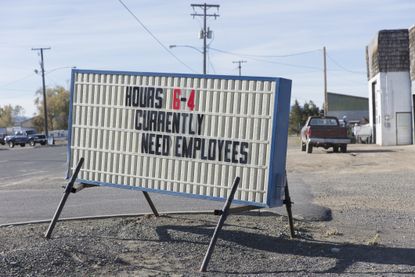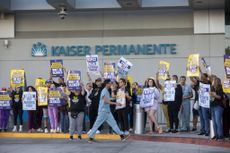The daily business briefing: October 4, 2023
Interest rates hit 16-year high, US job openings rise unexpectedly, and more


A free daily digest of the biggest news stories of the day - and the best features from our website
Thank you for signing up to TheWeek. You will receive a verification email shortly.
There was a problem. Please refresh the page and try again.
1. Interest rates hit 16-year high
Long-term interest rates surged Tuesday to the highest level since the subprime mortgage crisis of 2007, chipping away at hopes that the Federal Reserve's inflation-fighting campaign to raise rates won't trigger a recession. The yields on the 10-year Treasury note climbed 0.119 percentage points to 4.801%. Mortgage rates, which loosely follow Treasury yields, also rose. The average rate on the benchmark 30-year fixed mortgage climbed to 7.72% on Tuesday, CNBC reported, citing Mortgage News Daily. The 30-year fixed rate started the year with a drop to about 6%, but rose steadily over the summer. Higher rates have hurt sales of new and existing homes by driving up monthly payments. The Wall Street Journal, CNBC
2. Job openings rise unexpectedly
U.S. job openings rose unexpectedly to 9.6 million in August, up from 8.9 million in July, the Labor Department reported Tuesday. Economists had expected vacancies to come in at 8.9 million again. The number of layoffs and people quitting remained essentially unchanged. It was the first increase in job openings in three months. The data indicated that the job market remains strong despite the Federal Reserve's aggressive campaign to raise interest rates to slow the economy and bring inflation down to its 2% target. "Yes, the job market is still retaining a lot of heat," said Nick Bunker, head of economic research at the Indeed Hiring Lab, "but it hasn't gone back on the boil." The Associated Press
3. Ford offers bigger raise, still less than striking workers want
Ford Motor Co. said Tuesday it had given the United Auto Workers a new contract proposal that includes a wage hike of more than 20%. Ford said the "costly" offer would put its 57,000 union workers in the top quarter of U.S. hourly and salaried jobs. This was the automaker's seventh offer to the UAW, which launched an unprecedented strike against all three of Detroit's Big Three automakers — Ford, General Motors and Chrysler's Stellantis — nearly three weeks ago. The union started out demanding a 40% pay increase, but now seeks a hike of at least 30% to end the strike, according to Bloomberg News. The union didn't immediately comment on Ford's latest offer. Bloomberg
Subscribe to The Week
Escape your echo chamber. Get the facts behind the news, plus analysis from multiple perspectives.

Sign up for The Week's Free Newsletters
From our morning news briefing to a weekly Good News Newsletter, get the best of The Week delivered directly to your inbox.
From our morning news briefing to a weekly Good News Newsletter, get the best of The Week delivered directly to your inbox.
4. 8 Chinese companies accused of supplying fentanyl chemicals
U.S. federal officials on Tuesday announced criminal charges against eight Chinese companies for allegedly supplying chemicals for illegal production of synthetic drugs, including fentanyl and methamphetamine. Twelve of the companies' executives also face charges. This was the Biden administration's second major wave of indictments against companies in China for allegedly providing Mexican drug cartels with drugmaking chemicals. The finished drugs are fueling the U.S. overdose epidemic, which is killing more than 100,000 people a year, The Washington Post reported. Attorney General Merrick Garland said at a Justice Department news briefing that the "global fentanyl supply chain, which ends with the deaths of Americans, often starts with chemical companies in China." The Washington Post
5. Stock futures little changed after Tuesday's losses
U.S. stock futures were mixed early Wednesday as bond yields continued to rise. Futures tied to the Dow Jones Industrial Average and the S&P 500 were little changed at 6:45 a.m. ET. Nasdaq futures were down 0.1%. Jumps in job openings and Treasury yields sparked a sell-off on Tuesday. The Dow and the S&P 500 fell 1.3% and 1.4%, respectively, and the tech-heavy Nasdaq plunged 1.9%. "Interest rates are the primary driver of equity performance today and have been for the better part of two months," Ross Mayfield, investment strategy analyst at Baird, told CNBC. Investor's Business Daily, CNBC

Continue reading for free
We hope you're enjoying The Week's refreshingly open-minded journalism.
Subscribed to The Week? Register your account with the same email as your subscription.
Sign up to our 10 Things You Need to Know Today newsletter
A free daily digest of the biggest news stories of the day - and the best features from our website
Harold Maass is a contributing editor at TheWeek.com. He has been writing for The Week since the 2001 launch of the U.S. print edition. Harold has worked for a variety of news outlets, including The Miami Herald, Fox News, and ABC News. For several years, he wrote a daily round-up of financial news for The Week and Yahoo Finance. He lives in North Carolina with his wife and two sons.
-
 Ben Fountain's 6 favorite books about Haiti
Ben Fountain's 6 favorite books about HaitiFeature The award-winning author recommends works by Marie Vieux-Chauvet, Katherine Dunham and more
By The Week Staff Published
-
 6 picturesque homes in apartments abroad
6 picturesque homes in apartments abroadFeature Featuring a wall of windows in Costa Rica and a luxury department store-turned-home in New Zealand
By The Week Staff Published
-
 Why 2023 has been the year of strikes and labor movements
Why 2023 has been the year of strikes and labor movementsThe Explainer From Hollywood to auto factories, workers are taking to the picket lines
By Justin Klawans Published
-
 The daily business briefing: October 6, 2023
The daily business briefing: October 6, 2023Business Briefing Exxon Mobil is close to deal to buy shale-driller Pioneer, the SEC sues Musk for testimony on Twitter stock purchase, and more
By Harold Maass Published
-
 The daily business briefing: October 5, 2023
The daily business briefing: October 5, 2023Business Briefing Kaiser Permanente workers walk out, opening arguments launch Sam Bankman-Fried's trial, and more
By Harold Maass Published
-
 The daily business briefing: October 3, 2023
The daily business briefing: October 3, 2023Business Briefing Tesla sales slip despite price cuts, Microsoft CEO Satya Nadella testifies in Google antitrust trial, and more
By Harold Maass Published
-
 The daily business briefing: October 2, 2023
The daily business briefing: October 2, 2023Business Briefing Late-night talk shows return after writers end strike, student loan payments resume, and more
By Harold Maass Published
-
 The daily business briefing: September 29, 2023
The daily business briefing: September 29, 2023Business Briefing Newsom signs $20 minimum wage for California fast food workers, EEOC accuses Tesla of racial harassment, and more
By Harold Maass Published
-
 The daily business briefing: September 28, 2023
The daily business briefing: September 28, 2023Business Briefing China Evergrande suspends trading on Hong Kong stock exchange, oil prices jump to highest level in a year, and more
By Harold Maass Published
-
 The daily business briefing: September 27, 2023
The daily business briefing: September 27, 2023Business Briefing The FTC accuses Amazon of running an illegal online monopoly, Biden visits auto workers on picket line, and more
By Harold Maass Published
-
 The daily business briefing: September 26, 2023
The daily business briefing: September 26, 2023Business Briefing Ford halts work at $3.5 billion electric-vehicle battery plant, Costco offers members basic health care services, and more
By Harold Maass Published










